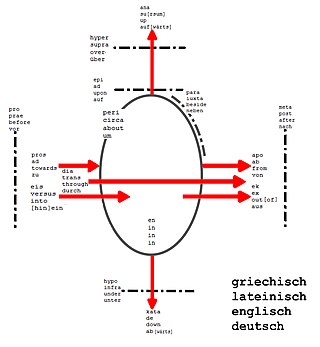Related Research Articles
In linguistics, the grammar of a natural language is its set of structural constraints on speakers' or writers' composition of clauses, phrases, and words. The term can also refer to the study of such constraints, a field that includes domains such as phonology, morphology, and syntax, often complemented by phonetics, semantics, and pragmatics. There are currently two different approaches to the study of grammar: traditional grammar and theoretical grammar.

A prefix is an affix which is placed before the stem of a word. Adding it to the beginning of one word changes it into another word. For example, when the prefix un- is added to the word happy, it creates the word unhappy. Particularly in the study of languages, a prefix is also called a preformative, because it alters the form of the words to which it is affixed.

Robert Lowth was a Bishop of the Church of England, Oxford Professor of Poetry and the author of one of the most influential textbooks of English grammar.
A grammar school is one of several different types of school in the history of education in the United Kingdom and other English-speaking countries, originally a school teaching Latin, but more recently an academically oriented secondary school, differentiated in recent years from less academic secondary modern schools. The main difference is that a grammar school may select pupils based on academic achievement whereas a secondary modern may not.

Prefect is a magisterial title of varying definition, but essentially refers to the leader of an administrative area.

Upsilon or ypsilon is the 20th letter of the Greek alphabet. In the system of Greek numerals, Υʹ has a value of 400. It is derived from the Phoenician waw .
In English, the plural form of words ending in -us, especially those derived from Latin, often replaces -us with -i. There are many exceptions, some because the word does not derive from Latin, and others due to custom. Conversely, some non-Latin words ending in -us and Latin words that did not have their Latin plurals with -i form their English plurals with -i. Some words' plurals end in -i even though they are not Latin, or that is not the Latin plural, e.g., octopi is sometimes used as a plural for octopus. Prescriptivists consider these forms incorrect, but descriptivists may simply describe them as a natural evolution of language.

Traditional rank amongst European royalty, peers, and nobility is rooted in Late Antiquity and the Middle Ages. Although they vary over time and among geographic regions, the following is a reasonably comprehensive list that provides information on both general ranks and specific differences. Distinction should be made between reigning families and the nobility – the latter being a social class subject to and created by the former.

A pedant is a person who is excessively concerned with formalism, accuracy and precision, or one who makes an ostentatious and arrogant show of learning.

The word schoolmaster, or simply master, refers to a male school teacher. This usage survives in British private schools, both secondary and preparatory, and a few Indian boarding schools that were modelled after British public schools, but is generally obsolete elsewhere.
In Latin grammar, a gerundive is a verb form that functions as a verbal adjective.

The Skinners' School, is a British Grammar School with academy status for boys located in the town of Royal Tunbridge Wells, Kent, England. Established in 1887, the school was founded by the Worshipful Company of Skinners in response to a demand for education in the region. Today Skinners' remains an all-boys grammar school, recently awarded specialist status in science and mathematics in recognition of these disciplines' excellent teaching. The current enrolment is 1119 pupils, of whom around 325 are in the sixth form. The first headmaster was Reverend Frederick Knott, after whom Knott House is named. The current Headmaster is Edward Wesson.

The Ratio atque Institutio Studiorum Societatis Iesu, often abbreviated as Ratio Studiorum, was a document that standardized the globally influential system of Jesuit education in 1599.
The grammar–translation method is a method of teaching foreign languages derived from the classical method of teaching Ancient Greek and Latin. In grammar–translation classes, students learn grammatical rules and then apply those rules by translating sentences between the target language and the native language. Advanced students may be required to translate whole texts word-for-word. The method has two main goals: to enable students to read and translate literature written in the source language, and to further students' general intellectual development. It originated from the practice of teaching Latin; in the early 16th century, students learned Latin for communication, but after the language died out it was studied purely as an academic discipline. When teachers started teaching other foreign languages in the 19th century, they used the same translation-based approach as had been used for teaching Latin. The method has been criticized for its shortcomings.

Sheng Kung Hui Tsang Shiu Tim Secondary School is a school in Hong Kong that was founded in September 1978 by Sheng Kung Hui (Anglican), Diocese of Hong Kong and Macao. Located in Wo Che Estate, Shatin, it is a grammar school subsidized by the Hong Kong Government.

J, or j, is the tenth letter in the Latin alphabet, used in the modern English alphabet, the alphabets of other western European languages and others worldwide. Its usual name in English is jay, with a now-uncommon variant jy. When used in the International Phonetic Alphabet for the y sound, it may be called yod or jod.

C, or c, is the third letter in the Latin alphabet, used in the modern English alphabet, the alphabets of other western European languages and others worldwide. Its name in English is cee, plural cees.

Derby School was a school in Derby in the English Midlands from 1160 to 1989. It had an almost continuous history of education of over eight centuries. For most of that time it was a grammar school for boys. The school became co-educational and comprehensive in 1972 and was closed/renamed in 1989. In 1994 a new independent school called Derby Grammar School for boys was founded.

The Canterbury Academy is a co-educational 11-19 academy school in Canterbury, Kent, England. It is a specialist Sports College and 15% of its 1081 pupils are selected on musical aptitude. The school was founded as a non-selective secondary modern foundation school before gaining academy status in 2010.

I, or i, is the ninth letter and the third vowel letter of the Latin alphabet, used in the modern English alphabet, the alphabets of other western European languages and others worldwide. Its name in English is i, plural ies.
References
- Chambers 20th Century Dictionary (W. & R. Chambers Ltd, 2004)